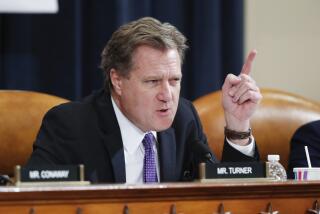White House takes ‘hard look’ at Russian proposal on Syria
WASHINGTON -- White House officials say they will “take a hard look” at a Russian offer to push Syria to give up its vast chemical weapons arsenal, a late and unexpected proposal that could provide President Obama a way to avoid a bruising defeat in Congress over use of force.
Tony Blinken, Obama’s deputy national security advisor, said the Obama administration was skeptical but open to the Russian proposal, which emerged Monday morning in response to Secretary of State John F. Kerry’s off-the-cuff remark about how Syria could avoid a U.S. missile strike in retaliation for an alleged lethal nerve gas attack near Damascus last month.
Kerry said at a news conference in London that Syrian President Bashar Assad could forestall a U.S. attack by giving up his sizable stockpile of chemical weapons immediately. Although the State Department quickly sought to squelch Kerry’s comments as “rhetoric,” not a serious proposal, Russian Foreign Minister Sergei Lavrov quickly offered to push Assad to agree.
That put the White House on the spot, and Obama’s aides quickly began to acknowledge the idea might have merit.
DOCUMENT: U.S. report on Syrian chemical weapons
“We’ll talk to the Russians about it,” Blinken said at a White House news briefing Monday afternoon. Blinken said that the administration learned of the proposal only a couple of hours earlier when it was made public. Still, the White House sought to take credit for it.
“It’s very important to note that it’s clear that this proposal comes in the context of the threat of U.S. action and the pressure that the president is exerting,” Blinken said. “So it’s even more important that we don’t take the pressure off and that Congress give the president the authority he’s requested.”
Russia, Assad’s strongest ally, has largely blocked international attempts to censure or pressure the Assad government at the United Nations.
But Lavrov said Monday that Russia would urge Assad to place Syria’s stockpile of nerve gases, blister agents and other chemical agents under U.N. supervision for eventual destruction. He said Russia also would push Syria to sign the Chemical Weapons Convention, the international treaty that prohibits use of poison gas.
The Syrian government quickly put out a statement saying it would cooperate.
The fast-moving events presented at least the possibility of a diplomatic and political solution for a crisis that has dominated the White House for the last 10 days. After threatening to launch a military attack to punish Assad’s forces for the alleged Aug. 21 attack, Obama abruptly decided to seek congressional support for military action.
But intense lobbying last week failed to draw broad support in Congress, and the White House could flop in its efforts to win a vote authorizing use of force.
Shortly after Lavrov floated the idea, some key congressional leaders seemed to embrace it as a possible way to avoid a U.S. attack.
Sen. Dianne Feinstein (D-Calif.), who chairs the Senate Intelligence Committee, issued a statement saying she would “welcome such a move.” Former Secretary of State Hillary Rodham Clinton, speaking at an unrelated event at the White House, said, “If the regime immediately surrendered its stockpiles to international control ... that would be an important step.”
If it occurs, it would be a step that began as a stumble.
At a morning news conference with British Foreign Secretary William Hague, Kerry said in response to questions that if Assad wanted to avoid a strike he could give up his weapons within seven days. State Department spokeswoman Jen Psaki later sent an email to reporters stressing that Kerry’s comment was “rhetorical,” and not intended as a substantial proposal.
“His point was that this brutal dictator with a history of playing fast and loose with the facts cannot be trusted to turn over chemical weapons. Otherwise he would have done so long ago,” Psaki wrote.
But Lavrov said Russia had asked Syria to place its chemical weapons stockpile under international supervision. Although Syria has never confirmed having chemical weapons, Foreign Minister Walid Moallem said his government welcomed the Russian request.
FULL COVERAGE: The debate on Syria
If the U.S. could win Syria’s agreement to give up its chemical arsenal, that would be a goal worth forgoing a military strike, said Jeffrey Lewis, a nonproliferation expert at the Monterey Institute of International Studies.
“We want to deter and prevent something like this from happening again, and we could do that if they got rid of them,” he said. “As much as I would like to hold people accountable, in the ugly world of international politics, my first goal is to keep more people from dying.”
The international community could still pursue charges against Assad and his generals in connection with the alleged Aug. 21 attack, Lewis said.
But eliminating Syria’s arsenal has been a long-standing goal of U.S. foreign policy. “Syria is the last big chemical weapons holdout,” he said. “It’s really worth doing.”
ALSO:
An insult grows into violence in India; 31 dead
Spreading Internet rumors in China can mean jail time under new rules
Syria backs Russian proposal for regime to hand over chemical weapons
Twitter: @khennessey
kathleen.hennessey@latimes.com
Ken Dilanian in Washington contributed to this report.
More to Read
Start your day right
Sign up for Essential California for news, features and recommendations from the L.A. Times and beyond in your inbox six days a week.
You may occasionally receive promotional content from the Los Angeles Times.








